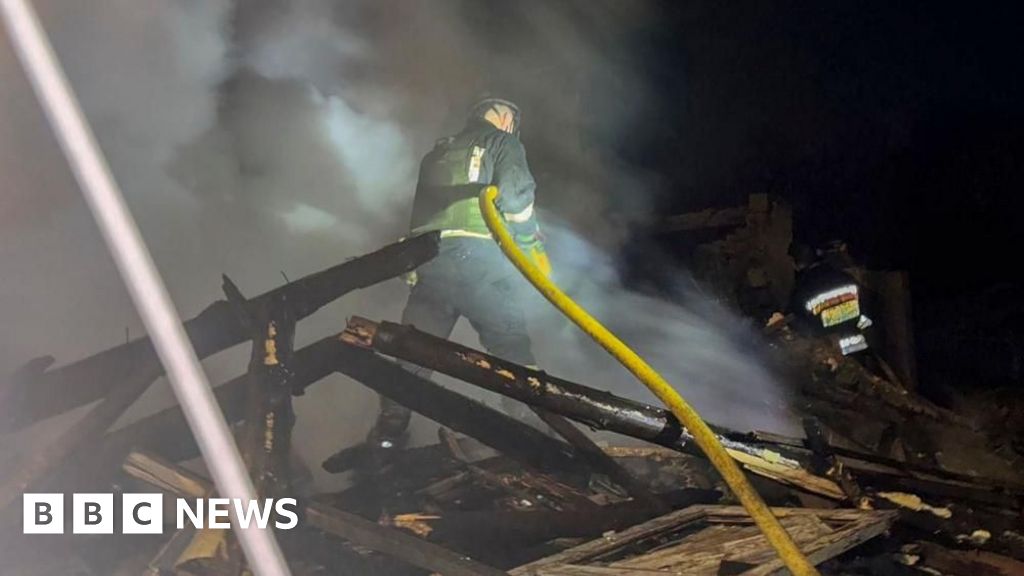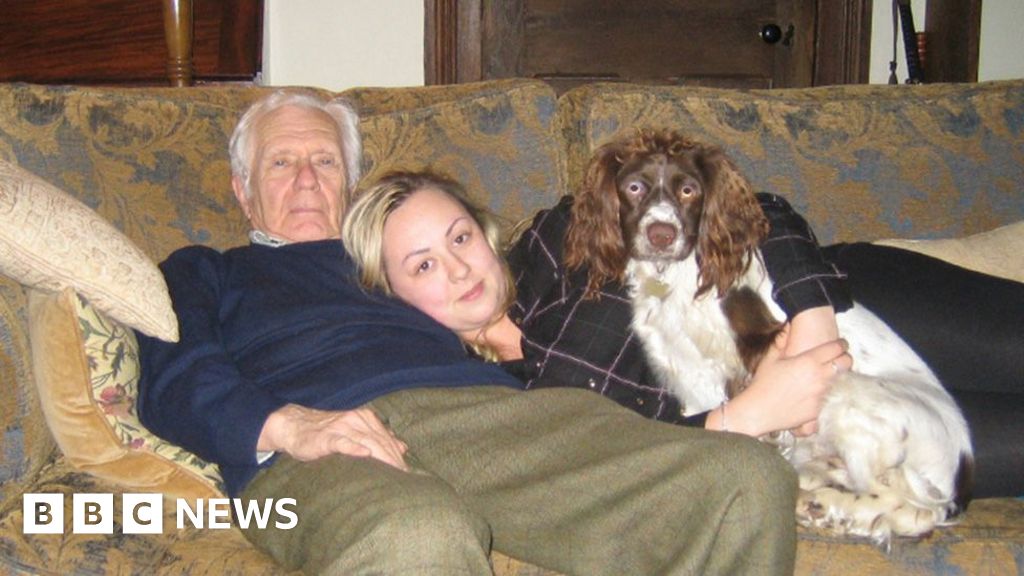Reaction in Israel and Gaza to death of Yahya Sinwar
Many Israelis cheered and danced on the streets at the news that Hamas leader Yahya Sinwar - chief architect of the 7 October 2023 attack on Israel - had been killed.
But his death at the hands of Israeli forces in Gaza on Wednesday has raised anxieties for families of the 101 hostages still held by Hamas.
Meanwhile, few Palestinians believed Sinwar's killing would bring an end to the devastating year-old war in Gaza.
Israel's military offensive in Gaza has killed at least 42,500 Palestinians, the Hamas-run health ministry in Gaza says. It followed Hamas's attack on Israeli communities on 7 October last year, which killed about 1,200 people and saw the group take 251 hostages.
People in Israel were overwhelmingly supportive of Sinwar's killing in a chance encounter with Israeli troops.
In Tiberias in northern Israel, several hundred people danced, waved flags and played loud music at the news.
“It’s very good“, Nissim Weizmann told the BBC as he sat outside a grocery shop in the town.
"He’s a bad man and his time has come. This is a present for everyone. Both Palestinians who are with us and the Jews."

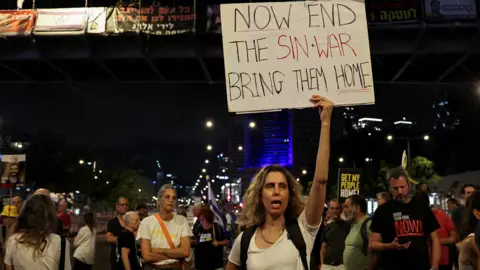 Reuters
Reuters
Families and supporters of hostages taken by Hamas gathered to demand Israel arrange their release
At a beach just south of Tel Aviv, bathers cheered and applauded when a lifeguard first announced rumours of the death over a loudspeaker.
But others were more circumspect, wondering how Sinwar's killing would affect prospects for the release of Israeli hostages who continue to be held by Hamas in Gaza.
"To be honest, I feel a bit numb," Anat Ron Kandle in Tel Aviv told the Reuters news agency.
"I have a deep concern for the hostages, and it's very difficult to find faith and hope.
"And I always think about, what if that could have been me, [it] could have been my son that was with me?"

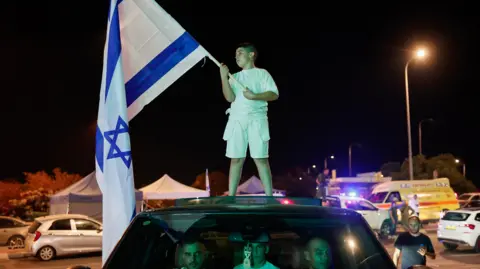 Reuters
Reuters
Celebrations in Sderot near Gaza following the news of Sinwar's death
Family members of the remaining 101 hostages still in Gaza gathered in Tel Aviv after the news broke.
They have been demonstrating for months, urging the Israeli government to reach a ceasefire deal with Hamas to get their relatives home.
Einav Zangauker, whose son Matan was taken hostage, urged Israeli Prime Minister Benjamin Netanyahu: "Don't bury the hostages."
"Go out now to the mediators and to the public and lay out a new Israeli initiative," she said to Reuters.
"If Netanyahu doesn't use this moment and doesn't get up now to lay out a new Israeli initiative - even at the expense of ending the war - it means he has decided to abandon the hostages in an effort to prolong the war and fortify his rulership."

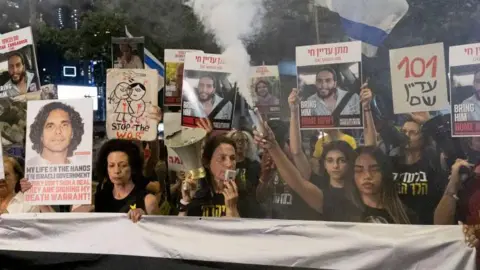 Getty Images
Getty Images
Protesters calling for the release of the hostages after the news of Sinwar's death broke
In Gaza, some Palestinians said they believed Sinwar's death could open a path towards ending the war, saying it left Israel with "no reason to continue this genocide".
"They always said they wanted to eliminate Sinwar to stop this war," Ali Chameli told Reuters.
But the reality on the ground since his killing was "quite the opposite", said Jemaa Abou Mendi.
Speaking to the AFP news agency, he said: "the war has not stopped, and the killings continue unabated."

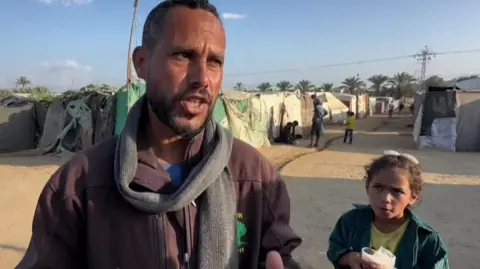 AFP
AFP
Jemaa Abou Mendi said Israeli attacks were continuing to kill Palestinians in Gaza
Speaking in the city of Khan Younis, which has been largely left in ruins by a year of bombardment and fighting, Dr Ramadan Faris said the outcome of the war did not depend on any single person's fate.
"It's a war of extermination against the Palestinian people, as we all know and understand," he said.
Also in Khan Younis was Lina Anuni, who fled Gaza City with her three children a year ago.
“I opposed [Sinwar] while he was alive and hold him equally responsible, alongside the Israeli occupation, for my suffering and that of 2.3 million Palestinians," she told the BBC.
"Yet, I felt a sense of sadness at his passing,” she added.
One man, who chose not to be identified, told the BBC World Service's Gaza Today programme that though there were "differing opinions" about the former Hamas leader, his death would not change things for people in Gaza.
"I don't believe this will change the dynamics of the conflict," he said, citing how the deaths of other senior Hezbollah and Hamas figures - like Hassan Nasrallah last month - had resulted in "nothing fundamentally" shifting.
"Instead, tensions escalated further, raising concerns for us as Palestinians," he said.
Some Palestinians described Sinwar as a martyr.
Yousef Jamal, who said he supported the 7 October attack on Israel, said: "He [Sinwar] did not hide among the displaced, seek refuge with enemy prisoners, or retreat into tunnels.”
Yahya Sinwar, 61, was said to have spent much of his time hiding in tunnels along with a small team of bodyguards and a "human shield" of hostages seized from Israel.
But reports indicate he met his end in an encounter with an Israeli patrol in southern Gaza. No hostages were found with him.
 5 months ago
555
5 months ago
555


